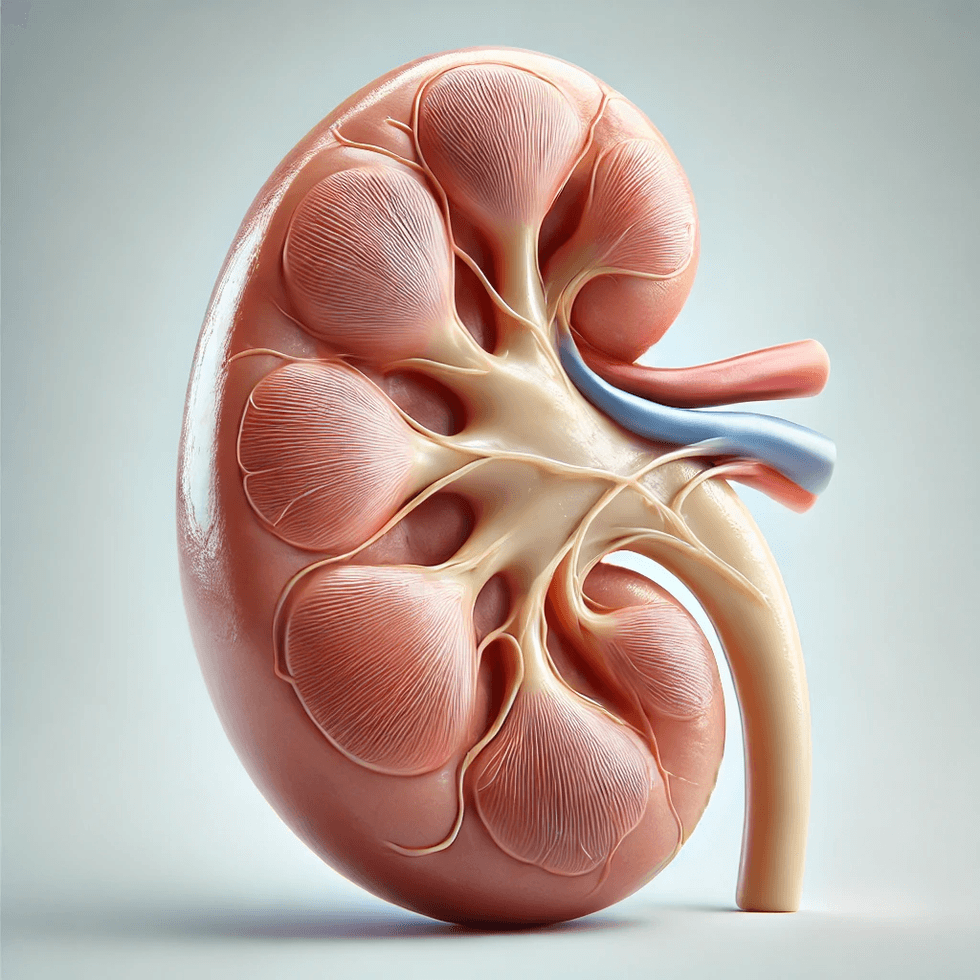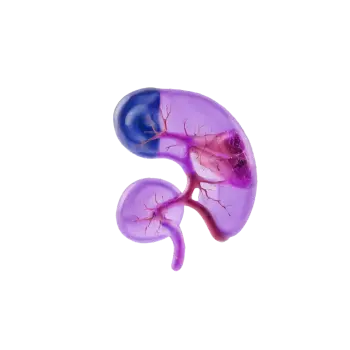Quick version
The kidneys are located near the spine, filtering blood and removing waste products that are converted into urine. They regulate blood pressure via renin, balance electrolytes, and stimulate blood production. Each day, they filter 1,500 liters of blood, with 1.5 liters becoming urine. Creatinine and cystatin C tests provide an accurate assessment of kidney function and can detect damage early.
The kidneys balance fluids and protect against electrolyte imbalances that affect heart rhythm and muscles. Risk factors such as diabetes and high blood pressure make regular check-ups essential. Early signs of kidney disease include fatigue, swelling, changes in urination, and high blood pressure, but most kidney problems develop slowly and without symptoms.
Where are the kidneys located?
The kidneys are located on either side of the spine, just below the ribs, in the back of the abdominal cavity. Although they are deeply situated in the body, some individuals may experience pain or discomfort in this area, which is sometimes mistaken as "kidney pain." However, it is important to note that lower back pain is more commonly associated with muscles or the spine rather than the kidneys themselves. The kidneys' primary role is to filter and cleanse the blood of waste products and excess water, which is then converted into urine and excreted via the urinary tract. In addition to this, the kidneys perform several other critical functions.
- Regulating blood pressure by releasing hormones like renin, which influence blood vessel constriction and sodium absorption.
- Balancing electrolytes such as sodium, potassium, and calcium to ensure optimal nerve and muscle function.
- Stimulating blood formation through the hormone erythropoietin, which signals the bone marrow to produce more red blood cells during oxygen deficiency.
These processes are essential for maintaining the body's homeostasis and overall good health.
Blood filtration
Approximately 1,500 liters of blood pass through your kidneys each day, with about 180 liters filtered by the millions of nephrons in each kidney. Of this, only about 1.5 liters are converted into urine, while the remaining fluids and nutrients are reabsorbed by the body. The nephrons function as small biological filters, separating useful substances such as glucose and amino acids from waste products like urea and creatinine. This filtration process is vital for maintaining a stable internal environment.
Analyzing the concentration of urea and creatinine in the blood provides important information about kidney function, along with other relevant kidney markers. Elevated levels of these waste products can indicate impaired filtration capacity, often a sign of kidney damage or failure. By analyzing these values, we can evaluate how effectively the kidneys remove waste from the blood, maintaining the body's internal balance.
Regulation of fluid and electrolyte balance
The kidneys are also crucial for regulating the body's fluid levels and electrolyte composition. By adjusting the amount of water and electrolytes excreted in urine, the kidneys help:
- Prevent dehydration or fluid overload.
- Maintain an optimal pH balance in the blood by excreting hydrogen ions and reabsorbing bicarbonate.
- Protect against dangerous electrolyte imbalances that can affect heart rhythm and muscle function.
How to monitor kidney function
Monitoring kidney health is particularly important for individuals with risk factors such as diabetes, high blood pressure, or a family history of kidney disease. A common method involves blood tests that often include creatinine analysis, which is used to calculate eGFR (glomerular filtration rate). This provides an estimate of how efficiently the kidneys filter blood.
Elevated creatinine levels can be a sign of reduced kidney function.
Cystatin C, a protein filtered by the kidneys, offers a more reliable measure of kidney function as it is less affected by factors such as muscle mass, age, and sex. When eGFR is calculated based on Cystatin C, it provides an even more accurate assessment of the kidneys' filtration capacity. This is particularly valuable for early detection of kidney problems or to confirm results from creatinine-based calculations. Combining both creatinine and Cystatin C in analyses gives the most comprehensive picture of kidney function, which is recommended in cases of uncertainty or when muscle mass might influence the results.
Other methods for evaluating kidney function include:
- Urine tests: These can detect protein leakage (albuminuria) or blood in the urine, which may be early signs of kidney damage.
- Imaging: Ultrasound, CT, or MRI can be used to visualize the kidneys and detect anatomical abnormalities, obstructions, or tumors.
- Blood pressure monitoring: Since high blood pressure can both cause and result from kidney issues, regular blood pressure checks are important.
Can you feel kidney pain?
Symptoms of kidney diseases vary, and pain from the kidneys is typically experienced as discomfort or pressure in the flank area, between the lower ribs and hips on the back. Many kidney diseases develop very slowly and without clear symptoms initially. Being aware of early signs can help prevent more serious issues.
- Fatigue and weakness: Caused by toxin buildup and reduced production of red blood cells.
- Swelling: Edema in the feet, legs, or face may indicate fluid retention.
- Changes in urination: Symptoms such as foamy urine, blood in the urine, or altered frequency of urination can be warning signs.
- Nausea and loss of appetite: A result of accumulated waste products in the blood (uremia).
- High blood pressure: Kidney damage can disrupt blood pressure regulation, leading to hypertension.
Common kidney diseases
Chronic kidney disease
A slow and often irreversible decline in kidney function. CKD is typically associated with underlying conditions such as diabetes and high blood pressure. Treatment includes lifestyle changes, medication, and, in severe cases, dialysis or transplantation.
Acute kidney injury
A sudden reduction in the kidneys' filtration capacity, often caused by sepsis, dehydration, or medications. With prompt treatment, function can often be restored.
Kidney stones
Small, hard crystalline deposits that form in the kidneys and can cause intense pain. Treatment includes pain management, increased fluid intake, and sometimes surgery.
Practical tips for maintaining kidney health
Protecting your kidneys is an investment in your health. Drink enough water, ideally 1.5–2 liters per day unless restricted, and choose a healthy diet low in salt, rich in antioxidants, and high in fiber. Regular exercise helps stabilize blood pressure and maintain a healthy weight, while avoiding tobacco and alcohol can prevent damage to blood vessels and kidney function. If you have risk factors such as diabetes or high blood pressure, it is essential to keep these under control with the help of your healthcare provider. By caring for your kidneys, you can enhance your health and prevent long-term problems.























